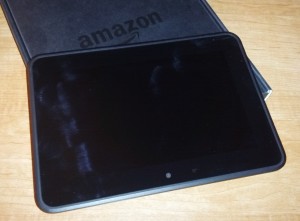 For Christmas, I picked up two tablets. A Nexus 7 for Lisa and the rest of the family, and a Kindle Fire HD for me to experiment and play around with. We’ve had the devices for seven months now, and my position hasn’t changed from what I wrote six months ago – I still feel that tablets are luxury items. To prove my point, here’s my experience with the two devices.
For Christmas, I picked up two tablets. A Nexus 7 for Lisa and the rest of the family, and a Kindle Fire HD for me to experiment and play around with. We’ve had the devices for seven months now, and my position hasn’t changed from what I wrote six months ago – I still feel that tablets are luxury items. To prove my point, here’s my experience with the two devices.
Nexus 7
The Nexus 7 is a very nice device. The high resolution screen is easy on the eyes, the form factor is great, and the hardware is well built, designed and solid. I figured Lisa would enjoy using it as an alternative to the computer for email and that she would like the bigger screen for her internet consumption, such as Facebook. I also figured she might try reading a couple of books on it. As for the kids, I figured they might enjoy playing some games or watching some videos on it.
It was tracking my usage projections for the first month, but since then, usage has tailed off considerably. In fact, it spends a lot more time in a kitchen drawer than it does in operation. I’ll occasionally see Lisa checking up on Facebook in the morning or evening, but she has reverted to spending more of her time checking her phone (a Galaxy Nexus) for emails and status updates, and she uses our computer for any heavy email activity. Any books she’s read over this year have been old school paperbacks. The kids have reverted back to their smartphones for everything they do.
I’m not surprised that the Nexus 7 didn’t revolutionize our lives, but I’m not disappointed that I picked one up either. There still could be some compelling use cases for a tablet that will be discovered in the next year or two. For example, I’m very curious to try out Google’s Chromecast dongle paired with a Nexus 7. That could be a use case that could change how the device gets used around our house. Until then, I suspect it will just continue to gather dust in our kitchen drawer.
Kindle Fire HD
I purchased the Kindle Fire HD as an expensive toy for myself. I wanted to try out the user interface and check out some usage scenarios such as books, video watching, and apps.
Form my experience, the Fire has been awesome for reading books. In the last 7 months, I’ve read more books than I have in the past 5 years. The Fire is easy to read on, it’s extremely portable, and it’s dead simple to add content. Amazon has it wired when it comes to purchasing eBooks, and their recommendation engine is amazing once your reading volume picks up. I haven’t found the device useful for much else, so other than for reading, I don’t find myself using it.
In other words, the Kindle Fire HD is an expensive e-Reader for me. Given how much I’ve read this year, it’s been worth it. If I continue to read at the pace I’m on, then it will have been a smart purchase, although I would still contend that it is not an essential one.
Should you buy a tablet?
I still can’t unconditionally recommend tablets to people.They are content consumption and entertainment devices, and expensive ones that don’t replace your computer, smartphone or television. So unless you plan to do a lot of content consumption, I would recommend that you wait until some more compelling use cases are discovered for tablets. As I mentioned before, Chromecast is just one example of how tablets will become more useful, but my gut tells me that there are several more on the horizon.
As I said in January, tablets still can’t replace your computer or laptop. Once they do, then they will be essential devices. Until that time, they will remain luxury devices.
